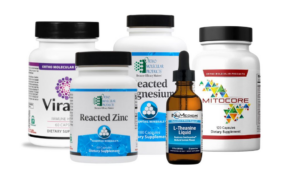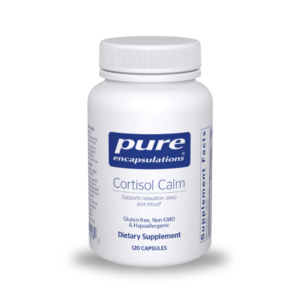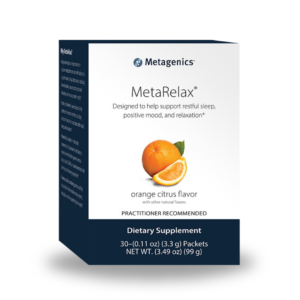At Morgan Compounding Pharmacy, we recognize that managing stress and maintaining balanced cortisol levels are crucial for overall health. Cortisol, often called the “stress hormone,” is essential for many body functions but can cause various health issues when levels are consistently high. To help you manage these levels and enhance your overall wellness, we recommend a holistic approach combining lifestyle interventions with targeted supplements.
The Role of Cortisol in the Body
Produced primarily by the adrenal cortex, cortisol helps us respond to stress by altering energy production, immune function, and heart rate. It fluctuates throughout the day, aiding in daily rhythm and metabolic processes.

However, consistently high levels, often caused by chronic stress, can disrupt this balance, leading to negative impacts on the brain, cardiovascular system, and other organs.
What Leads to High Cortisol Levels?
Several factors can influence cortisol levels, with chronic stress being a significant contributor to persistently elevated levels. When stressed, the body’s stress response system activates the hypothalamic pituitary adrenal (HPA) axis. This activation leads the pituitary gland to release adrenocorticotropic hormone (ACTH), which in turn prompts the adrenal glands to produce cortisol.
Additional factors that can disrupt cortisol balance include:
- Pituitary tumors, which impact the function of the anterior pituitary gland.
- Addison’s disease, characterized by the adrenal glands’ failure to produce adequate cortisol.
- Cushing’s syndrome, caused by prolonged exposure to high levels of cortisol.
“Disruptions in cortisol regulation due to chronic stress, disease, and aging have profound implications for multiple bodily systems. “
Source: Cells
Related Article:
The Role of Cortisol in Chronic Stress, Neurodegenerative Diseases, and Psychological Disorders

High cortisol levels’ effects on various body systems
- Brain: Elevates neurotransmitter levels, reduces hippocampus activity, and shrinks the prefrontal cortex.
- Gut: Raises inflammation levels, increases gut permeability, reduces gut movement, and disrupts the gut microbiome.
- Immune System: Boosts inflammation, diminishes white blood cell production, and lowers antibody levels.
- Cardiovascular System: Increases both heart rate and blood pressure.
- Liver: Encourages inflammation and contributes to insulin resistance.
- Thyroid: Suppresses the production of thyroid hormones.
- Bones: Lowers bone density and prevents the formation of new bone cells.
- Hormones: Reduces the production of both estrogen and testosterone.
- Muscle: Degrades muscle tissue, inhibits protein synthesis, and heightens muscle inflammation.
- Skin: Increases oil production and reduces skin elasticity.
Signs of High Cortisol Levels
- Waking up at 2–3 AM and can’t go back to sleep
- Always tired but can’t sleep
- Brain fog
- Sugar and salt cravings 24/7
- Emotional/moody
- Hair thinning or falling out
- Digestive issues
- Immune system issues
- Carrying weight in face & midsection
Pharmacist-Recommended Cortisol Support Supplements
At Morgan Compounding Pharmacy, we advocate for the use of high-quality, scientifically backed supplements to aid in cortisol management:
- Cortisol Calm by Pure Encapsulations
- Potential Benefits: This supplement is designed to maintain a healthy cortisol response and support relaxation, restful sleep, and positive mood during times of occasional stress.
- Key Ingredients: It includes Sensoril® ashwagandha extract, which has been shown to promote relaxation and support healthy sleep, mood, and cognitive function. Rhodiola, magnolia, and l-theanine help maintain adrenal health and emotional well-being, while vitamin D supports normal cortisol production within abdominal adipocytes.
- MetaRelax® by Metagenics
- Flavor and Form: This great-tasting orange citrus-flavored magnesium powder is easy to integrate into your daily routine.
- Potential Benefits: MetaRelax® enhances absorption and intestinal tolerance of magnesium, which is critical for calcium metabolism and muscle relaxation. It also includes taurine, vitamins B6, B12, and folate, which support neurotransmitter synthesis for mood, sleep, and relaxation.
- Unique Features: Magnesium in MetaRelax® aids in muscle contraction and relaxation, and nervous system health. Vitamins B6, B12, and folate help produce serotonin, enhancing mood and relaxation, while taurine supports brain health.

Lifestyle Changes to Support Cortisol Balance
Managing cortisol isn’t just about supplementation; it’s about creating a lifestyle that supports hormonal balance and reduces stress:
- Regular Physical Activity: Exercise can help reduce cortisol levels and improve your mood.
- Balanced Diet: Eating a diet rich in whole foods, proteins, fats, and carbohydrates can stabilize blood sugar and cortisol levels.
- Adequate Sleep: Ensuring you get enough rest each night can help normalize cortisol rhythms.
- Mindfulness and Relaxation: Techniques such as meditation, yoga, or spending time in nature can lower cortisol and enhance your overall sense of well-being.
Why Choose Morgan Compounding Pharmacy?
At Morgan Compounding Pharmacy in Georgia, we specialize in creating personalized strategies for improving patients’ health that include both lifestyle advice and high-quality supplements like Cortisol Calm and MetaRelax®. Our team of pharmacists works closely with each patient and their healthcare providers to ensure that all aspects of health are addressed, helping you achieve and maintain optimum wellness.
Visit Morgan Compounding Pharmacy today to learn more about how our supplements and prescription compounds can help you manage stress and maintain a healthy cortisol level for a better, more balanced life.
Purchase your health supplements directly from our pharmacy. Shipping nationwide.
Replete
Supplement Program
by Morgan Compounding Pharmacy
One of the side effects of prescription medications is the depletion of vital nutrients and vitamins in your body.


Professional supplementation program
Contact Us Today

For personalized compounding solutions, visit us at visit us at 305 South Main Street, Alpharetta, Georgia 30009, or fax your Rx Order Forms to 770-809-5048.
References
Kirschbaum, C., Prussner, J. C., Stone, A. A., Federenko, I., Gaab, J., Lintz, D., … & Hellhammer, D. H. (1995). Persistent high cortisol responses to repeated psychological stress in a subpopulation of healthy men. Psychosomatic medicine, 57(5), 468-474.
Knezevic, E., Nenic, K., Milanovic, V., & Knezevic, N. N. (2023). The Role of Cortisol in Chronic Stress, Neurodegenerative Diseases, and Psychological Disorders. Cells, 12(23), 2726.
Lara, V. P., Caramelli, P., Teixeira, A. L., Barbosa, M. T., Carmona, K. C., Carvalho, M. G., … & Gomes, K. B. (2013). High cortisol levels are associated with cognitive impairment no-dementia (CIND) and dementia. Clinica chimica acta, 423, 18-22.
Schoorlemmer, R. M. M., Peeters, G. M. E. E., Van Schoor, N. M., & Lips, P. T. A. M. (2009). Relationships between cortisol level, mortality and chronic diseases in older persons. Clinical endocrinology, 71(6), 779-786.



